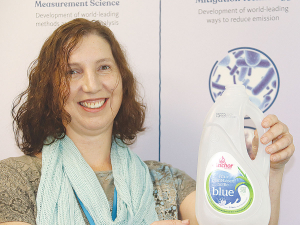Another Windfall for Fonterra Farmers, Unit Holders
Fonterra farmer shareholders and unit holders are in line for another payment in April.
 Emily Thomas, Fonterra’s sustainable packaging lead, with a milk bottle made from Brazilian sugar cane.
Emily Thomas, Fonterra’s sustainable packaging lead, with a milk bottle made from Brazilian sugar cane.
From sugar cane in Brazil to a sustainable, plant-based, plastic milk container now on sale in NZ supermarkets.
This is just one of many innovations being developed by Fonterra, as the dairy co-op moves to make all its packaging recyclable, reusable or compostable by 2025.
Recently, the company invited media to see, first-hand, some of its innovations in packaging and product development being undertaken at its Technical Centre at Palmerston North.
Packaging is a big issue, with strong community pressure for companies such as Fonterra to improve the sustainability of its packaging materials. The company says packaging is a complex global issue and the materials used are very complex, but it’s doing its bit to better understand what recyclable actually means in all its markets.
Emily Thomas, who is Fonterra’s sustainable packaging lead, says not only must new packaging be recyclable. It also has to meet rigid food safety requirements and deal with the natural complexities that happen with products such as cheese, which require quite specific conditions to maintain its shelf life.
“If you think about something like cheese, we are going to wrap up a 20kg block of cheese in plastic, put it in a box and then allow it to mature for some months or even years,” Thomas explains.
“There are cheeses that continue to ferment, if you think of Swiss cheese there are holes in it and they are developed by gas during that maturation process. If we don’t let some of that gas out of the bag it’s going to explode, but we don’t want a bag with holes in it either because we don’t want the water to drain out because the cheese will dry out.”
Thomas says Fonterra is working with packaging suppliers both in NZ and overseas to ensure that it has the best options available. She says new materials are being developed such as a recyclable film to wrap Mozzarella cheese that Fonterra now produces.
She says new recyclable sachets for milk powder are now being trialled and if this proves successful it will add to the array of sustainable packaging being used by Fonterra.
On the home front, a new Anchor brand, 2 litre milk bottle was released on the market towards the end of last year. In one sense, it’s a polyethylene bottle just like the standard bottle, but it’s different in that it is made from ethanol, which is made from sugar cane grown in Brazil.
The bottle looks slightly different, in that the plastic appears to be thinner and lighter. From the consumer’s point of view, it is slightly more expensive because the resin is more expensive to make. Like the old bottle, it is also recyclable, Thomas says.
“The polyethylene, instead of being sourced from the petrochemical industry, has been manufactured from sustainably produced sugar cane,” she explains. “You can make ethanol from sugar cane – that’s been done for years and the ethanol can be turned into polyethylene. But the big advantage is that its carbon footprint is very low.”
Thomas says having a milk bottle with a low carbon footprint gives consumers an option and it’s a matter of choice. But Fonterra has no plans to make all its milk containers from ethanol because that would put up the overall price of milk and potentially reduce market share in a competitive market.
Fonterra says the introduction of the plant based milk bottle is just one example of the company’s sustainable packaging commitment in action.
The Meat Industry Association of New Zealand (MIA) today announced that Chief Executive Officer Sirma Karapeeva has resigned from the role.
The winners of the 2026 Hawke’s Bay/Wairarapa Dairy Industry Awards were announced at the annual awards dinner held at Copthorne Solway Park in Masterton on Thursday evening.
Environment Southland is welcoming this week’s decision by the Environmental Protection Authority (EPA) to approve the release of Blaptea elguetai, a leaf‑feeding beetle that will help control the highly invasive Chilean flame creeper.
This March, the potato industry is proudly celebrating International Women’s Day on 8 March alongside the International Year of the Woman Farmer, recognising the vital role women play across every part of the sector — from paddocks and packhouses to research, leadership, and innovation.
Fruit trader Seeka posted a record profit and returns to shareholders in 2025.
Recent weather events in the Bay of Plenty, Gisborne/Tairawhiti, and Canterbury have been declared a medium-scale adverse event.
OPINION: Staying with politics, with less than nine months to go before the general elections, there’s confusion in the Labour…
OPINION: Winston Peters' tirade against the free trade deal stitched with India may not be all political posturing by the…